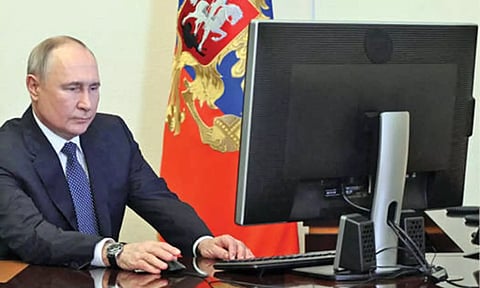

• JURI RESCHETO
RUSSIA: When Vladimir Putin is — likely —reelected as Russian president this weekend, many people will be asking themselves what to expect from his next term in office. What will Putin do this time? How far will he distance Russia from the European Union and US in the coming six years in power? And how was it possible that hopes for Russian-European rapprochement have been dashed? How could Putin — a leader to which many had pinned great hopes when he rose to power — become so staunchly anti-Western 24 years later? Vitaly Mansky and Alexander Stefanov, two Russians with two very different backgrounds and a significant age gap, have tried to make sense of these questions. Both are known to millions of Russians. Mansky, 60, has produced dozens of award-winning documentaries, making him Russia’s best-known documentary filmmaker. He got to know Putin personally, producing two films about the Russian president
The 24-year-old Stefanov is known for his controversial online presence; he is one of Russia’s best-known historians on YouTube. He believes he understands Putin thanks to media reports and his political science studies. Mansky was given a behind-the-scenes look at the Kremlin when he shot his 2000 documentary film “Russia — the Beginning.” At night, Mansky followed Putin to his private residence and accompanied him to his swimming pool the next morning. During filming, the director got know the president better than almost all other Kremlin officials. Today, Mansky lives in Latvia and has no interest in ever meeting Putin again.
YouTube historian Stefanov, meanwhile, still lives in Russia and dreams of one day meeting Putin in person. He has never known any other Russian leader but Putin.
“A change of power? How does that even work,” he jokingly asked. After all, Putin took power in the Kremlin when Stefanov was born. Stefanov recalls first becoming aware of Putin at the age of 10, when he watched a comedic political television show.
“There was an episode with a playful portrayal of the time Putin-Medvedev swapped roles,” he said. “I thought how cleverly Putin had managed the whole thing! What a clever guy!” He was referring to the time when Putin temporarily took on the role of Russian prime minister after his second presidential term. Putin’s childhood friend, Dmitry Medvedev, became president in his place, until the two later swapped roles again.
Yet over the years, Stefanov’s view of Putin has grown increasingly negative. “I saw him less and less as a human and more and more as a fearless political actor without doubts,” he said. This shift in perception was the result of Russian state propaganda, said Stefanov. “They dehumanized and glorified Putin so that everyone could say: ‘He was given to us by God!’”
Mansky draws on his own personal observations to explain Putin’s metamorphosis. He visited the Kremlin before Putin came to power, during the 1990s, when politicians “walked around in azure sweaters and woollen scarves” — a casual dress code that was probably a sign of the liberal policies under Putin’s predecessor, Boris Yeltsin.
“The [presidential] elections were held on March 26, 2000, then came the May inauguration and then — whoosh! — the entire atmosphere changed in September,” he remembered.